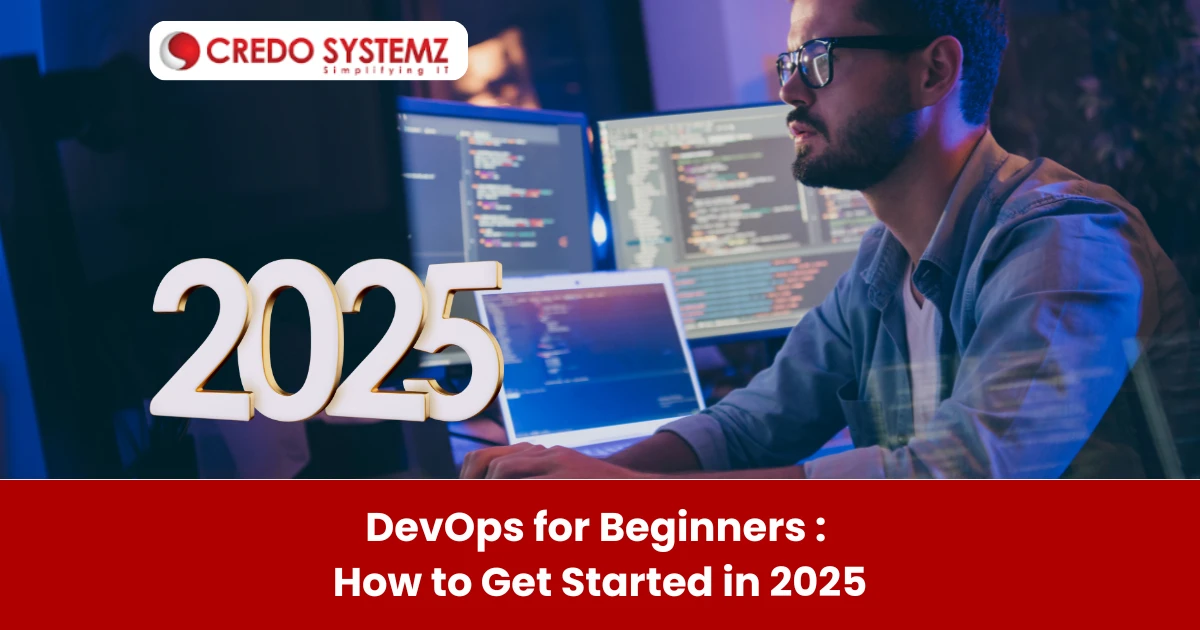
Introduction
DevOps has transformed software development by bridging the gap between development and operations teams that enables faster and reliable software delivery. The demand for DevOps professionals is expected to grow in the near future as organizations are adopting advanced tools and practices to enhance efficiency. This guide is designed for beginners to start their DevOps journey.
Introduction to DevOps
DevOps is a combination of practices, tools, and a cultural philosophy that achieve collaboration between software development (Dev) and IT operations (Ops). The primary goals of DevOps include:
Reasons To Learn DevOps in 2025
The need for DevOps professionals is skyrocketing, with businesses focusing on digital transformation. The highest-paying tech job roles are DevOps Engineer and Site Reliability Engineer.
With advancements in tools like Kubernetes, GitHub Actions, and AI-driven automation, staying updated offers exciting job opportunities and career growth.
Getting Started: A Step-by-Step Guide
The important steps involved in learning DevOps are:
- Mastering the fundamentals
- Learning basic programming
- Familiarize with operating system
- Master version control
- Explore CI/CD tools
- Dive into Containerization and Orchestration
- Learn Infrastructure as Code (IaC)
- Get Comfortable with Cloud Platforms
- Practice Monitoring and Logging
1.Understand the Fundamentals
Before diving into tools and practices, it is necessary to understand the core principles of DevOps:
- Continuous Integration (CI): Merging code changes frequently to detect issues early.
- Continuous Delivery (CD): Automating software release processes.
- Infrastructure as Code (IaC): Managing infrastructure using code for consistency and automation.
- Monitoring and Feedback: Continuously tracking performance and user feedback for improvement.
2. Learn Basic Programming
Foundational knowledge of programming is essential. Start with:
- Python: Popular for scripting and automation.
- Bash: Useful for managing Unix/Linux environments.
3. Get Familiar with Operating Systems
Most DevOps workflows involve Linux-based systems, so learn:
- Linux command-line tools (e.g., grep, awk, sed)
- File systems and process management
4. Master Version Control
Git is the cornerstone of DevOps. Learn:
- Branching and merging
- Pull requests and code reviews
- Tools: Git, GitHub, GitLab, or Bitbucket
5. Explore CI/CD Tools
Automating builds, tests, and deployments is critical. Popular tools include:
- Jenkins
- GitHub Actions
- GitLab CI/CD
- CircleCI
6. Dive into Containerization and Orchestration
Containers simplify software deployment by packaging applications with their dependencies. Tools to learn:
- Docker: For creating and managing containers.
- Kubernetes: For container orchestration and scaling.
7. Learn Infrastructure as Code (IaC)
Automating infrastructure setup is crucial. Focus on:
- Terraform: For cloud-agnostic IaC.
- Ansible: For configuration management and automation.
8. Get Comfortable with Cloud Platforms
Cloud computing is integral to modern DevOps. Gain experience with:
- AWS: Amazon Web Services
- Azure
- Google Cloud Platform (GCP)
9. Practice Monitoring and Logging
Understanding system performance and debugging issues are vital. Explore:
- Prometheus: For monitoring metrics.
- Grafana: For data visualization.
- ELK Stack (Elasticsearch, Logstash, Kibana): For log management.
Essential Courses for Beginners
To master the skills of DevOps, Credo Systemz is the best platform that provides DevOps training in Chennai. The DevOps courses include standard curriculum, qualified trainers, practical training, industrial practices, live projects and certification support.
Practical Tips for Success
- Start small as a beginner and to build a strong foundation: Begin with one tool or concept and gradually expand.
- Build projects: Practice by creating pipelines, deploying applications and automating workflows.
- Join Communities: Engage with DevOps forums, attend meetups, and contribute to open-source projects.
- Stay Updated: Follow trends, blogs, and industry news to keep up with evolving technologies.
Conclusion
DevOps offers endless job opportunities for those willing to learn and adapt in 2025. By understanding the basics, mastering essential tools, and continuously practicing, you can build a strong foundation for a rewarding career. Start your journey today, and embrace the dynamic world of DevOps!
Join Credo Systemz Software Courses in Chennai at Credo Systemz OMR, Credo Systemz Velachery to kick-start or uplift your career path.
